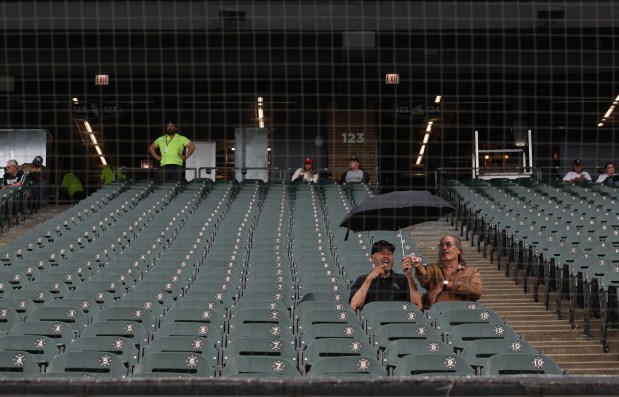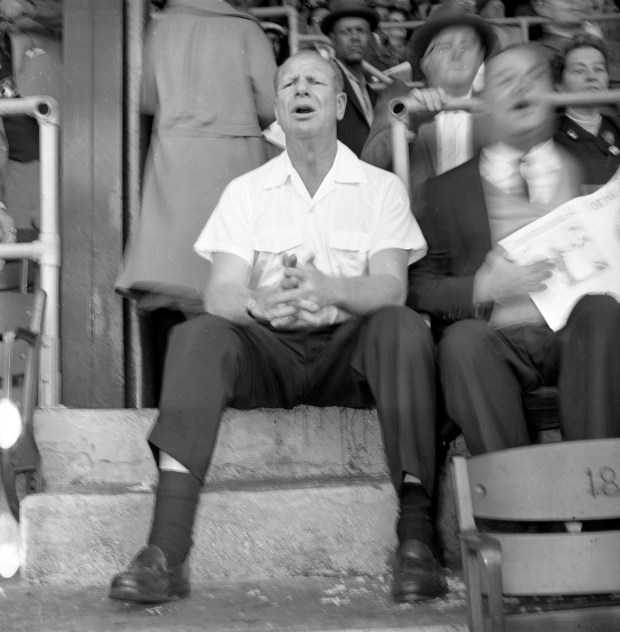Back in another era, Chicago White Sox owner Bill Veeck used to sit in the front row of the center-field bleachers at Wrigley Field with some of his friends, including Otto “Dutch” Denning.
This was in 1983, when Veeck was boycotting Comiskey Park over a perceived slight by then-Sox President Eddie Einhorn, who said he and partner Jerry Reinsdorf would make the club a “high-class operation” after taking over the team from Veeck.
Veeck, in his retirement years as a normal Cubs fan, would bring a basket full of food to eat and had every kind of suntan lotion and sunblock imaginable. He would look at a person’s skin and tell them which one to apply for the perfect tan. Denning, a Lane Tech catcher who had a two-year career with Cleveland in 1942-43 and went on to manage several minor-league teams, wore a big sombrero for reasons never explained. Whenever Cubs broadcaster Harry Caray excitedly said: “Hey, look at the guy in the sombrero,” he was usually referring to Denning.
Veeck and Denning were like characters from an old 1930s movie and they spent the entire game telling stories to anyone who would listen. The Cubs were still one year away from becoming a national story, so it wasn’t hard to find a last-minute ticket to watch them play out the string and get a history lesson at the same time. We didn’t know how lucky we were.
According to Veeck, he famously was in charge of planting the ivy and bittersweet vines on the outfield walls, and he oversaw the construction of the bleachers and manual scoreboard in 1937 and invented the exploding scoreboard at old Comiskey Park. He also had the Sox wear shorts on occasion in 1976 and approved the Disco Demolition Night promotion in 1979 that ended in a field-destroying riot.
No one was a bigger innovator in baseball and few owners were more beloved. After he announced he was selling the Sox in 1980 to a group led by Reinsdorf and Einhorn, the team held a “Bill Veeck Day” in which fans could come down to the field, shake his hand and tell him thanks or good riddance. Veeck was open to all opinions.
Like I said, it was a different era.
Sitting in the Wrigley bleachers with a baseball legend and his wacky friend did not seem abnormal to me and my friends. I interviewed Veeck only a few times at what he called his “outdoor office,” choosing to let him enjoy the game.
The last time happened during the final home game of the 1983 season for a Tribune story headlined: “Cubs Fans Never Lose Hope.” Veeck was answering questions from young fans about the playoff-bound White Sox and the hopeless Cubs. Someone asked Veeck if he would be the next Cubs general manager.
“I was out here before your father was born,” he said. “You think I don’t have enough trouble?”
I became a full-time reporter at the Tribune in 1984 and was unable to loiter in the bleachers regularly as Wrigley’s attendance exploded with the arrival of Rick Sutcliffe and those Cubs. I didn’t get to spend much time in the Veeck seats during the so-called Sandberg Summer, and after the great financial success of the ‘84 Cubs, the team’s owners — Tribune Co. — decided to do away with the decades-old policy of reserving bleacher tickets for day-of-game sales, allowing presales that would benefit the team and enrich the local scalpers.
In 1985, Veeck boycotted the Cubs, too, meaning he was a man without a ballpark in the final year of his life. He died in January 1986.
Veeck’s wife, Mary Frances, told me later that Bill, who started as an $18 office boy at Wrigley Field, was so upset about the Tribune Co.’s bleacher decision he felt obligated to make one final stand.
“It did bother him,” she said. “But he was definitely a man of integrity and principles. Bill felt the bleachers were the last bastion of the common man and woman. It wasn’t just a matter of picking a quarrel with the Tribune (Co.). I think he looked on (the presale of bleacher tickets) as being a little greedy and he just didn’t like that.”
Boycotting a team you love is never an easy decision. And for someone who loved baseball as much as Veeck, it had to be hard to give up going to games on either side of town.
Forty years after he attended his final baseball game in Chicago, I hear a lot from Sox and Cubs fans who tell me they plan to boycott the ballpark for the final two months of this stomach-churning season.
It goes without saying why they would want to boycott the Sox, who are on pace for the worst record in modern-day history and just blew the biggest trade-deadline opportunity in team history, making stars Garrett Crochet and Luis Robert Jr. go down with the ship.

Some Sox fans already have decided to stop going. The team closed off the upper deck for a few games during the last homestand because of a lack of interest, and antipathy toward Reinsdorf continues to accelerate as he hints at moving the team without public funding for a new ballpark. Many are hoping the Sox break the season record of 120 losses to spite ownership and management for its head-scratching decisions.
On the North Side, Cubs fans are clamoring for President Jed Hoyer’s head and tuning out a team that talked big in spring training but failed to back it up. All the revenue-enhancing measures the team implemented over the last decade to supposedly ensure an annual contender have only enriched the owners: the Ricketts family and its limited partners, including the family of Betsy DeVos, the former secretary of education under Donald Trump.
Politics and baseball don’t mix, which is another reason some won’t give the Rickettses their money.
The revenue streams from the Cubs-owned Marquee Sports Network, including the channel’s nonstop Prevagen ads between innings, haven’t helped the team compete. The ever-annoying sponsorships of every baseball moment crammed onto the radio broadcasts — “That foul ball is sponsored by your source for foul-odor protection …” — haven’t elevated the Cubs in the National League Central standings either.
And on Thursday the Cubs revealed their latest money grab: an “M” jersey patch for a sponsorship with Motorola, not the word “miserable.”
“Through this partnership, we’re aligning two iconic Chicago brands through innovation and tradition,” said Alex Seyferth, the Cubs vice president of corporate partnerships, in a press release.
Sure. But the sad truth is the Cubs lack innovation, trotting out most of the same team from 2023 and expecting better results, just like bringing back the same “Take Me Out To the Ball Game” singers year after year.
The Cubs’ idea of innovation is changing sponsors.
And the few traditions remaining at Wrigley are mostly ones Veeck helped bring about — the scoreboard, bleachers and the “W” or “L” flags raised after games, which originally were green for wins and red for losses.

Those traditions are why Wrigley Field remains on most baseball fans’ bucket lists, whether the team is in last place or not. Because that will never change, any idea of a boycott by local fans is meaningless. Like The Bean or Navy Pier, Wrigley is a Chicago tourist trap.
It’s going to be a rough two months at Chicago ballparks as the Cubs play out the string on the periphery of a wild-card race and the Sox try to avoid making history. No one can convince you otherwise.
But if you can focus on why you fell in love with the game while blotting out all the reasons you shouldn’t give your hard-earned money to the Rickettses or Reinsdorf, it’s still worth it to venture out and watch a game.
Life’s too short to give up the things that still give you pleasure. The older you get, the more you realize that truism.
So get some sunblock, make your own sandwich and enjoy yourself at the ballpark of your choosing.
The sombrero is optional.



